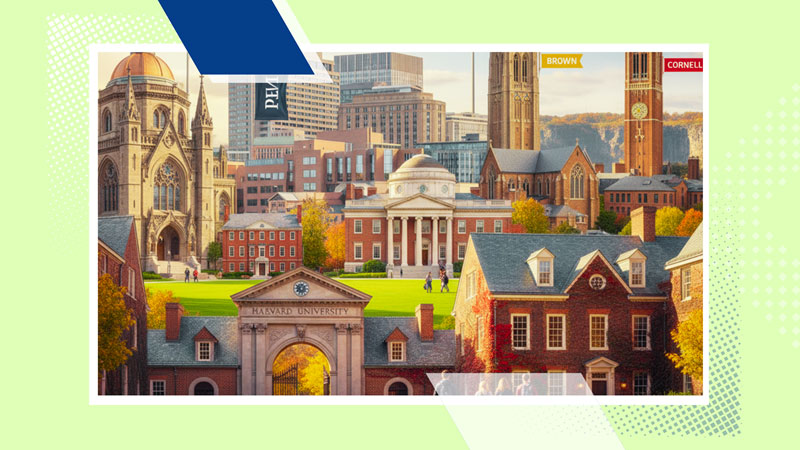Everything You Need to Know About the Ivy League Colleges
The term Ivy League evokes images of tradition, prestige, extraordinary academic standards, and highly selective admissions. But what exactly defines these schools? How hard is it to get in? What differences set each one apart? And how should you prepare your application strategy?
Here’s your 360° guide to Ivy League colleges from their history and admissions statistics to application tips, campus culture, and what makes each Ivy unique.
What Are the Ivy League Colleges?
The Ivy League is a group of eight private colleges and universities located mostly in the Northeastern United States. These schools share high academic standards, selective admissions, and well-known global reputations.
The eight Ivy League institutions are:
Originally formed as an athletic conference (in the 1950s), the Ivy League today represents elite higher education, strong alumni networks, and leadership in research and teaching.
Why Do These Schools Carry So Much Weight?
Here are a few reasons why Ivy League schools are viewed as elite choices:
-
Historical prestige: Many of them were founded in colonial America, with deep academic legacies and significant philanthropic endowments.
-
Selective Admissions & Low Acceptance Rates: All Ivies admit only a small fraction of their applicants.
-
Academic Rigor & Faculty Excellence: Their faculty includes leading researchers; students benefit from advanced labs, libraries, and mentorship.
-
Financial Aid & Resources: Despite high costs, many Ivies promise generous need-based aid or no-loan graduation for eligible students.
-
Strong alumni & networking influence, which can lead to outstanding careers in academia, business, government, and more.
These factors make Ivy League colleges high-status but also highly competitive.
Ivy League Admissions & Acceptance Rates
If you're wondering how tough it is to get into an Ivy League school, here’s what you need to know:
-
Across Ivy League schools, acceptance rates typically fall between 3% and 8%, depending on the university and admission round.
-
For instance, recent data points to Harvard’s acceptance rate being under 4 % in many years.
-
Cornell has a comparatively higher acceptance rate, often among the largest of the eight Ivies, yet still very selective.
Keep in mind: early-decision or binding admission rounds usually have higher acceptance rates than regular decision for the same school, due to smaller applicant pool and demonstrated interest.
If you’re targeting Harvard admissions, Princeton admissions, or applying to Yale, Brown, or any Ivy, make sure you understand both application timing and holistic assessment criteria.

Major Hudsons: What These Schools Are Known For Academically
Each Ivy League university has its own academic strengths and signature offerings. You’ll want to pick schools that align with your academic interests.
Here’s a quick snapshot (you’d research further for your own major fit):
-
Harvard University: renowned for business & economics, pre-med & life sciences, government, social sciences, and its vast cross-disciplinary opportunities.
-
Princeton University: noted for its strong undergraduate focus, research opportunities, engineering & computer science, mathematics, and theoretical disciplines.
-
Yale University: famous for humanities, social science excellence, arts, law, and broad liberal arts culture alongside STEM.
-
Columbia University: excels in urban studies, engineering & applied science, business, journalism, and programs that leverage its New York City location.
-
Cornell University: with a large campus and diverse range of majors which includes engineering, agriculture & life sciences, hotel & hospitality (unique among Ivies), and more.
-
UPenn: known for strong business / Wharton brand, hybrid liberal arts + pre-professional programs.
-
Brown & Dartmouth: both strong in liberal arts, flexible curriculums, and unique cultures that appeal to students seeking interdisciplinary or self-directed paths.
Choosing majors early, understanding departmental strengths, or exploring interdisciplinary opportunities is key to your Ivy strategy.
What Admissions Committees Seek (Beyond GPA & Test Scores)
To stand out, your application needs more than excellent academics. Here’s what Ivy admissions officers often look for:
-
Rigorous Coursework - Advanced Placement (AP), International Baccalaureate (IB), honors classes, or top-tier academic prep.
-
Standardized Test Consideration - Some Ivies are test-optional at present; strong SAT / ACT scores may help if submitted.
-
Extracurricular Depth & Leadership - Not thousands of clubs, but meaningful impact in one or two areas (STEM research, debate, public service, arts, etc.).
-
Personal Essays & Supplemental Essays - Authentic voice, reflection on your journey, intellectual curiosity, contribution to community, and fit with the university’s values.
-
Recommendations - Letters that show not just academic ability, but growth, character, collaboration, resilience.
-
Demonstrated Interest & Fit - Sometimes interviews, sometimes showing alignment with university mission (e.g., community service, research initiative).
-
Diversity, Global Perspective, & Unique Story - Applicants with uncommon backgrounds, cross-cultural experience, or innovative thinking often stand out.
Using these elements wisely gives you an edge in Ivy League applications.
How to Prepare Your Ivy Strategy (For Harvard, Princeton & Beyond)
Here are actionable steps you can take (starting high school or earlier) to optimize your chances:
-
Start early (Grade 9 or 10) - plan rigorous courses and summer activities.
-
Build a “spike” - a project, research initiative, or sustained activity you deeply care about.
-
Develop strong essays that reveal your personality, motivations, failures & growth.
-
Apply strategically - consider Early Decision / Early Action options where available.
-
Seek expert mentorship or counseling (especially for Ivy admissions tips, essay advice, portfolio reviews).
-
Focus on balance - academic excellence and meaningful impact (service, leadership, research, innovation).
-
Polish your profile by getting good test scores (if applicable), maintaining high grades, participating in high-impact clubs, or STEM competitions.
Frequently Asked Questions (FAQs)
Q1. How many Ivy League colleges are there?
There are eight Ivy League universities in the U.S. - Harvard, Princeton, Yale, Columbia, Brown, Cornell, Dartmouth, and UPenn.
Q2. What’s a typical Ivy League acceptance rate?
Acceptance rates are extremely low, often between 3 % and 8 %, depending on the school and admission round. Applicants should not rely solely on their test scores or GPA.
Q3. Is test-optional policy in place for Ivy League schools?
Yes, some Ivy League universities currently accept applications without SAT or ACT scores (test-optional). But submitting strong standardized test results can still boost your profile, especially if aligned with admitted-student ranges.
Q4. Which Ivy League school has the highest acceptance rate?
Cornell often has one of the highest acceptance rates among Ivies, though it remains very competitive.
Q5. Should I apply Early Decision or Regular Decision to Ivies?
Applying Early Decision or Early Action (where available) may increase your chances slightly due to smaller pools and demonstrated interest. But remember: ED is binding or semi-binding. Always weigh your portfolio strength and commitment before choosing it.
Final Thoughts
Ivy League colleges remain among the most competitive institutions in the world but they are not unreachable. You can improve your chances by building a coherent profile, telling your unique story, and preparing strategically across academics, activities, testing, and essays.
Whether you’re aiming for Harvard admissions, Princeton admissions, or applying to Yale, Columbia or Cornell, being intentional and starting early will always work in your favor.
Start your Ivy League journey with expert support from PathIvy. Schedule your free consultation today.
.png?width=175&height=73&name=ORIGINAL%20LOGO%20Blue%20and%20Green%20(1).png)
.png?width=50&name=author-image%20(2).png)

